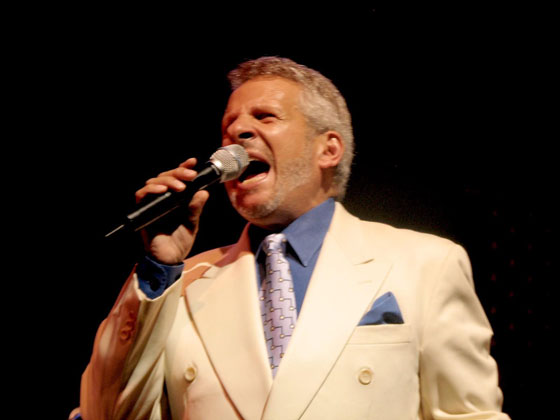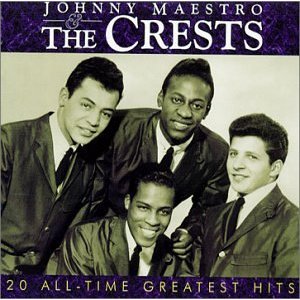Calling All Angels, Calling All Angels
Johnny Maestro
May 7, 1939-March 24, 2010Johnny Maestro, one of the greatest voices in rock ‘n’ roll history as lead singer for the Crests and the Brooklyn Bridge, died of cancer on March 24 in Cape Coral, Florida. He was 71. He is survived by his wife, Grace; his brother, Ronald; two daughters, Tracy and Lisa; a son, Brad; and four grandchildren.
Born John Mastrangelo, he began his career singing lead for The Crests, a group notable both for its five Top 40 hits between 1958 and 1960—including the classic “16 Candles,” for two weeks a #2 single in 1958 into 1959—and for its interracial makeup of African-Americans (Talmadge Gough and J.T. Carter), a Puerto Rican (Harold Torres) and an Italian (Maestro). The early Crests lineup also included a black female, Patricia Van Dross, whose younger brother, Luther Vandross, would become an R&B superstar in the ‘80s; Ms. Van Dross left the group when it started touring, over her mother’s fears that her 16-year-old daughter was too young to be on the road with four men.
With the Crests, Maestro employed his strong, plaintive tenor in service to songs specifically addressing teenage love and loss—a relationship on the rocks in “Trouble In Paradise,” yearning for love in “The Angels Listened In,” falling in love in the epic “16 Candles” and “Step By Step.” What Frank Sinatra was to romantic pop balladry for an earlier generation, Maestro was aiming for with the first rock ‘n’ roll generation. He left it to Dion to swagger and play the cock of the walk; Maestro was all about the heart and its deepest yearnings. Not for nothing did he so often beseech the angels to provide guidance, or did he sense their presence in shaping his romantic fortunes. Though not a writer, he followed the path of the finest pop interpreters in investing so much of his own spirit into his delivery that his performances often reached metaphysical heights of sensitivity, adding incalculable depths of transcendent emotion to his heartfelt testimonies and appeals. He was as fine a vocalist as his generation produced.
The Crests, a live performance of ‘Trouble In Paradise’In 1961 Maestro left the Crests to pursue a solo career. In the first half of ’61 he had two Top 40 hits on the Coed label (“Model Girl” and “What a Surprise”), but failed to sustain his momentum. Struggling along as a solo artist, in 1967 he was invited by members of a New York doo-wop group, the Del Satins (who had backed Dion on some of his post-Belmonts recordings), to replace their departed lead singer; they then joined forces with members of another band, Rhythm Method, and came up with the name Brooklyn Bridge as a joke, as in the group would be “harder to sell than the Brooklyn Bridge.”
The Crests, ‘The Angels Listened In’Rather than coming true, their fears were discounted in grand fashion. With Maestro’s tenor leads soaring over the group’s silky harmonies and robust horn section, the Bridge cut a version of “The Worst That Could Happen,” a class-conscious Jimmy Webb song of a relationship dissolving before the man’s very eyes when his girl decides to marry someone with money, that was identical in arrangement to the 5th Dimension’s original recording of it as a non-single track on the group’s Magic Garden album. The Brooklyn Bridge single was on the charts for 10 weeks and peaked at #3 in early January, 1969. The group did not enter the Top 40 again, but not for lack of memorable recordings: the followup to “The Worst That Could Happen,” “Welcome My Love,” did rise into the Top 50, but its B side, “Blessed Be The Rain” (another of Maestro’s suggestions of divine intervention in his love life) became one of the most popular and most requested songs in the group’s history. Still another single mixed the yin and the yang of Maestro’s spiritually centered sensibility—“You’ll Never Walk Alone” backed with an out-and-out cheating song, “Your Husband, My Wife.” All told, when its heyday was over, the Brooklyn Bridge sold more than 10 million records.
The Crests, ‘Sixteen Candles’Maestro continued performing for the rest of his life, often with a five-man Brooklyn Bridge lineup, and became an avid PBS supporter, always ready to do his part to spur listener contributions. Right to the end, he was singing great, in stark contrast to many of his contemporaries, whose once striking voices had succumbed to time’s unsympathetic march.
But then Johnny Maestro was on the side of the angels all along. —David McGee
The definitive Crests collection, 20 All-Time Greatest Hits, is available at www.amazon.com
Johnny Maestro, live at Cousin Brucie’s Rock ‘n’ Roll Party, ‘The Worst That Could Happen’
Founder/Publisher/Editor: David McGee
Contributing Editors: Billy Altman, Laura Fissinger, Christopher Hill, Derk Richardson
Logo Design: John Mendelsohn (www.johnmendelsohn.com)
Website Design: Kieran McGee (www.kieranmcgee.com)
Staff Photographers: Audrey Harrod (Louisville, KY; www.flickr.com/audreyharrod), Alicia Zappier (New York)
E-mail: thebluegrassspecial@gmail.com
Mailing Address: David McGee, 201 W. 85 St.—5B, New York, NY 10024




